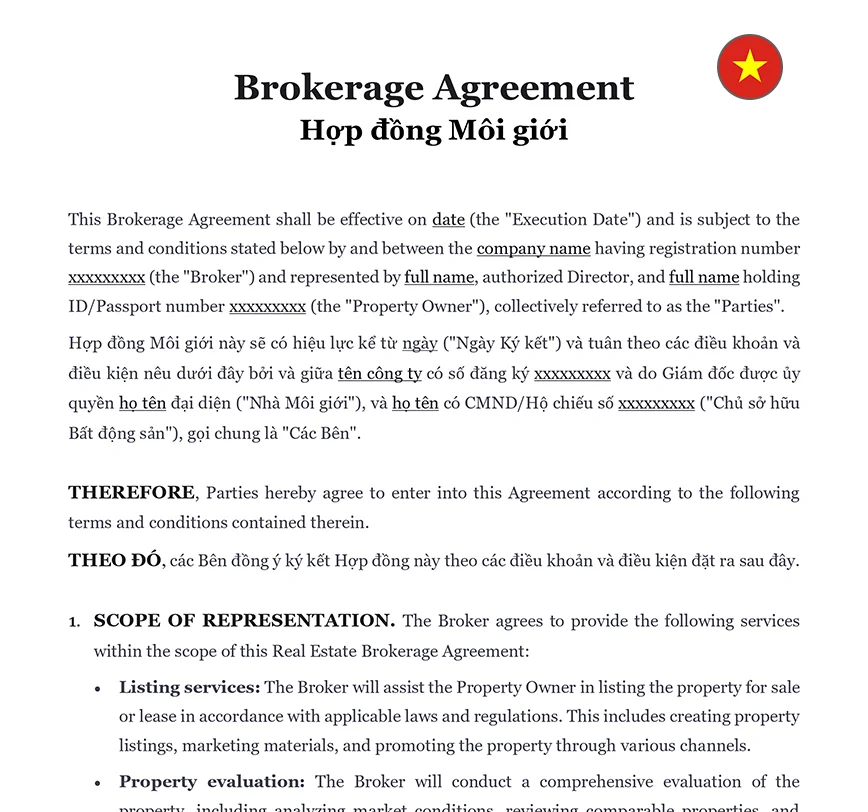Ready to use legal template
Drafted by experienced lawyers
Vietnamese-English translation
Ready to use legal template
Drafted by lawyers
Vietnamese-English translation
Home › Buy a property › Brokerage Agreement
Learn more about Brokerage Agreement in Vietnam
A Brokerage Agreement is a legally binding contract between a broker and a client, outlining the terms and conditions of their professional relationship. This agreement defines the responsibilities of the broker, such as finding buyers or tenants for a property, and the client’s obligations, such as payment of commissions. At Themis Partner, we offer a professionally drafted Brokerage Agreement tailored to the requirements of the law in Vietnam. Our document is provided in an easy-to-edit Word format, ensuring convenience and compliance for all parties involved.
Table of contents
-
What is a Brokerage Agreement?
-
What is included in a Brokerage Agreement?
-
Are there any legal requirements for a Brokerage Agreement in Vietnam?
-
Can a Brokerage Agreement be modified in Vietnam?
-
What happens if a client breaches a Brokerage Agreement?
-
What happens if I find a buyer or tenant on my own without the broker's help?
-
Can I negotiate the commission rate with the broker in Vietnam?
-
What happens if the property doesn't sell or rent during the agreement period?
-
Can I terminate a Brokerage Agreement early in Vietnam?
-
How do I know if a broker is licensed and reputable?
What is a Brokerage Agreement?
A Brokerage Agreement is a legally binding contract between a broker and a client that establishes the terms and conditions under which the broker will provide services to the client. These agreements are commonly used in real estate transactions but can also apply to other types of brokerage services. The agreement outlines the responsibilities of both parties, including the broker’s obligation to use their best efforts to find a suitable buyer, tenant, or other counterparties, and the client’s commitment to pay the agreed-upon commission or fees.
The agreement may specify the duration of the brokerage relationship, any exclusivity arrangements, and other relevant terms to govern the parties’ relationship. In Vietnam, Brokerage Agreements must comply with local laws and regulations, and it is advisable to seek legal advice to ensure that the agreement is enforceable and meets the specific needs of the parties involved.
What is included in a Brokerage Agreement?
A Brokerage Agreement typically includes several key elements to clarify the terms and conditions of the broker-client relationship. These elements may include:
1. Parties Involved
The agreement should clearly identify the broker and the client, including their contact information and any relevant business details.
2. Services Provided
It should outline the specific services the broker will provide, such as marketing the property, finding potential buyers or tenants, and negotiating deals on behalf of the client.
3. Duration of Agreement
The agreement should specify the duration of the brokerage relationship, including any start and end dates or conditions for termination.
4. Commission and Fees
The agreement should clearly state the commission or fees the client agrees to pay the broker for their services, including the amount or percentage and when payment is due.
5. Exclusivity
If the agreement includes exclusivity arrangements, such as the client agreeing not to work with other brokers for a specified period, this should be clearly outlined.
6. Confidentiality
Both parties may agree to keep certain information confidential, such as details about the property or sensitive financial information.
7. Termination Clause
The agreement should include provisions for how either party can terminate the agreement, including any notice requirements or penalties for early termination.
Are there any legal requirements for a Brokerage Agreement in Vietnam?
In Vietnam, Brokerage Agreements are subject to certain legal requirements to ensure their validity and enforceability. While specific requirements may vary, depending on the nature of the agreement and the jurisdiction, some general legal considerations may include:
1. Form: The agreement may need to be in writing to be enforceable, although oral agreements may also be valid in some cases.
2. Content: The agreement should clearly outline the services to be provided, the duration of the agreement, the commission or fees payable, and any other relevant terms and conditions.
3. Compliance: The agreement should comply with applicable laws and regulations, including any licensing requirements for brokers and any restrictions on brokerage activities.
4. Consumer Protection: The agreement should comply with consumer protection laws, including provisions relating to transparency, fairness, and the protection of consumer rights.
5. Language: The agreement should be in a language that both parties understand, and any translations should be accurate and certified if required.
6. Dispute Resolution: The agreement may specify how disputes between the parties will be resolved, such as through arbitration or mediation.
Can a Brokerage Agreement be modified in Vietnam?
In Vietnam, a Brokerage Agreement can be modified, but any changes should be made in accordance with the original agreement’s terms and with the agreement of both parties involved. Modifications are typically documented in writing to ensure clarity and to avoid misunderstandings. Both parties should sign the modified agreement to indicate their acceptance of the changes.
When modifying a Brokerage Agreement in Vietnam, it’s important to ensure that the changes comply with relevant laws and regulations. Any modifications that are inconsistent with the law or that contravene the original agreement’s terms may not be enforceable. It is advisable to seek legal advice before making any modifications to a Brokerage Agreement to ensure that the changes are legally valid and that they protect the rights and interests of both parties.
What happens if a client breaches a Brokerage Agreement?
If a client breaches a Brokerage Agreement in Vietnam, the broker may have several options to seek redress, depending on the terms of the agreement and applicable laws. Some possible consequences of breaching a Brokerage Agreement may include:
| ➤ Payment of Damages: The breaching party may be required to pay damages to compensate the broker for any losses suffered as a result of the breach. |
| ➤ Specific Performance: In some cases, the non-breaching party may seek a court order requiring the breaching party to fulfill their obligations under the agreement. |
| ➤ Termination of Agreement: The non-breaching party may choose to terminate the agreement, ending the broker-client relationship. |




